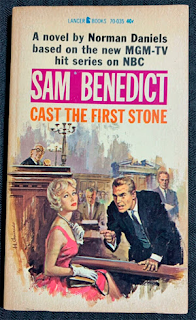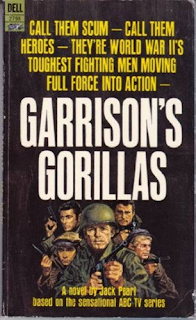I imagine the answer to this must be self-evident to most of you; after all, you wouldn't be here unless you already knew how to watch TV, right? (It certainly can't be for my sparkling, rapier-like wit and charm.)
But when you think about it—and, believe me, I have—there are different ways to watch TV, depending on the type of show you're watching. Sometimes, of course, all you need is some white noise, some background chatter to keep you from being distracted by doing something more important. (Like reading this esasy, for instance.) There are other times, though, when you find yourself drawn in by the storytelling, invited into a universe inhabited by the characters you see on screen. This is storytelling at its best. It causes you to think—not in the sense that you're attending a class or listening to a lecture, but because you become an active participant, either in confronting the challenges faced by the characters, or dealing with the issues raised in the story.
For example, let's look at a question raised in a recent episode of Sam Benedict, the legal drama I've been watching: should an attorney leave himself open to severe discipline, perhaps even disbarrment, for failing to provide an adequate defense for a man he knew was guilty? His secretary thinks not: she knows her boss as a good and decent man, and argues that he shouldn't be forced to put his own career on the line for a man who was clearly guilty. (The jury came in with a guilty verdict and death sentence in forty minutes.) Even if an appeal is upheld, the defendant will just be retried, convicted again, and executed anyway; why sacrifice yourself when you're not going to change anything?
For Sam Benedict, the issue is that everyone, regardless of their guilt or innocence, is entitled to a fair trial, and this man—regardless of his guilt or innocence—didn't receive one. His Sixth Amendment rights were violated because he didn't have an adequate defense. And now, hours from the scheduled execution, the attorney has no choice; he is duty-bound to act in the best interests of his client.
So what do you think? I know people who'd agree with the secretary, who'd say that there's no sense in giving up your own career over defending a man who was guilty anyway. People are funny that way; they're the same ones who are always saying that "if you're innocent, you don't have anything to fear." But we all know, or should know by now, that this ain't necessarily so. Sure, crime offends us, especially when the victim is a child or a senior citizen, innocent or defenseless. It's the same rationale used by cops who plant evidence on a suspect in order to guarantee a conviction. He's guilty anyway, they say to themselves and others; this is just to ensure nothing funny happens, whether you get a slick lawyer or a lenient judge or jury nullification. It's an easy call when guilt is obvious, right? Well, it is easy to be favor of justice for everyone in the abstract, but what happens when push comes to shove?
This is an example of a story that forces you to think about the questions being raised. You might wonder what you'd do in the same situation, but more likely you're finding that the episode may be challenging your beliefs, questioning your ideas; it might even force you to change your mind.
Then, there's a show like Combat!, where you find yourself in the middle of the action, with bombs bursting around you and bullets whizzing past your head. I don't know about you, but I find it impossible not to put myself in the battlefield, wondering what I'd do if it were me in that trench, seeing death and destruction everywhere—and being grateful that I was never in such a situation. Does it make you consider your opinion toward war and peace? You understand that you're being manipulated; after all, every storyteller tries to control the reaction that story produces, and the producers of Combat! made no bones about it being an anti-war drama, though not in a political sense.
But what happens when a storyline forces you to consider the wounded German soldier, perhaps the very one who was shooting at you just a few minutes ago, as a fellow human being? Is it still a situation of kill-or-be-killed, or do you look at him as a creation of God, deserving of being treated with dignity? You might argue that things are different in wartime, but Christ was well aware of war, yet He still admonished His followers to love their enemies. And again, you find yourself being asked: What would you do? Can you expect the Germans to live up to the Geneva Convention regarding prisoners of war if you're not prepared to do the same?
Granted, with shows like these, it's easy to sit back on your couch and declare your certainty that you'd do the right thing if it came to that, but in truth we can't know for sure; things are different when people are shooting at you, or if it's your daughter's killer on trial. One thing is for sure: it's an excellent way for you to come face-to-face with some uncomfortable truths.
Finally, there are those series that invite you to speculate on what Paul Harvey used to call the rest of the story. Hogan's Heroes is a perfect example of this kind of show; lacking a final episode, it's become something of a cottage industry for people to speculate on what happened after the series ended; I engaged in a bit of that myself, in one of the more popular pieces I've written here. But when people come to feel that they know and love the characters they see on screen, it becomes natural to speculate on what happens next.
One series that seems to be ripe for this kind of treatment is another World War II drama, Garrison's Gorillas. Unlike Combat!, Garrison's Gorillas is a more conventional action-adventure program, in which a team of convicts, each with a particular talent, is assembled into a fighting unit designed to carry out particularly difficult missions requiring the kinds of skills which Garrison's men possess. In return for taking part in these missions, the men are promised their freedom—six months after the war ends. But since the show was cancelled after a single season, we never know what the rest of the story is. Do they make it all the way through, or are some of them killed along the way? And does the government hold up their part of the bargain in the end?
After one particular mission, I had the disturbing thought that, in real life, things would not have gone so well for our heroes after the war. Remember, for instance, the pains to which Allen Dulles and the wartime spy machine took to ensure the secrecy of Operation Paperclip, the project that utlized German scientists, some of them war criminals, in the American rocket program. Would Dulles have been sanguine about the American public—or, even worse, American lawmakers—finding out that the U.S. military had recruited convicts, some of them perhaps dangerous, some of them perhaps security risks, to take part in missions that might well have involved documents that, after the war, could have been sold to the highest bidder? And that, as part of the deal, these convicts had been promised their freedom in return?
I wonder. Dulles was a devious type, likely part of the cabal to which Taylor Caldwell referred in last week's piece, and I think he would have wanted to keep this operation as secret as possible. Given the nature of criminals, I doubt he would have trusted them either to behave themselves or to keep quite. Therefore, the logical solution would be to have them all killed in the last days of the war. When I expressed this opinion to my wife, she sensibly pointed out that Garrison himself would never stand for such a thing. She's right, of course, which is why Garrision would also have to die. It probably would have been some kind of plane crash on the way back from a final mission, the kind of crash that often occurs to those whom the government views as a liability. A dark conclusion to the story, perhaps, but no less logical than many fan fictions that people write.
And when it comes to it, that's what this is all about. Fan fiction, like any other involvement in the characters and storylines of a television series, is nothing to be ridiculed. Whether or not the stories are logical and well-written or elementary pieces of tripe doesn't matter—what does is that people have engaged in these stories in a way that demonstrates how these programs made them think, rather than sit dully in front of a flickering screen doing their best impressions of someone in a vegetative state. People who say they don't want to be challenged by television shows, that they don't want to be made to think, are missing the whole point. (Remember a few weeks ago I wrote about how even game shows like Supermarket Sweep required the viewer to have a "detailed knowledge of market prices plus the ability to make arithmetical calculations, involving fractions, at high speed."
This isn't to say that every television show is a college-level ethics class masquerading as entertainment; there's enough evidence to the contrary to disabuse anyone of that notion. But a viewer shouldn't be intimidated by the idea of a television show causing those little gray cells to work. That, I think, is the way to watch television. And who knows—they might even find they like it. TV







Good writing is the key. I just don't see it today. You should do a post comparing the writing of shows like Combat and Naked City to todays fare.
ReplyDeleteThat's an excellent idea - great observation, James!
Delete